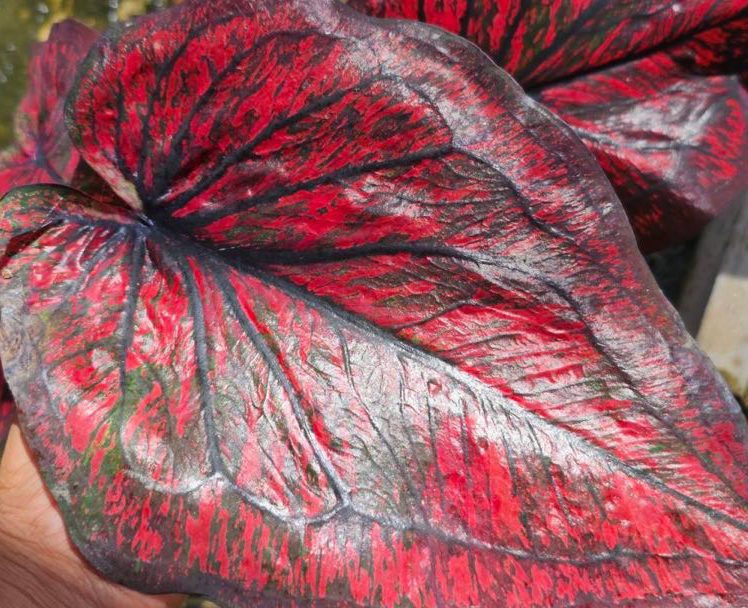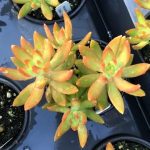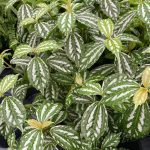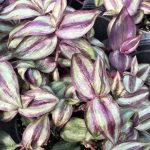Caladium, Silaphet
Price range: $49.99 through $59.99
Discount per quantity
| Quantity | 3 - 8 | 9 - 14 | 15+ |
|---|---|---|---|
| Price | Price range: $48.49 through $58.19 | Price range: $46.99 through $56.39 | Price range: $44.99 through $53.99 |
| % Discount | 3% | 6% | 10% |
Description
Caladium ‘Silaphet’
The Caladium ‘Silaphet’ is a remarkable ornamental plant celebrated for its stunning foliage and exotic beauty. A member of the Caladium genus, known for its vibrant and decorative leaves, Silaphet is a true masterpiece of nature. This rare variety is ideal for gardeners and plant enthusiasts seeking to add an artistic, tropical flair to their garden, patio, or indoor space.
The foliage of Caladium ‘Silaphet’ is the star attraction. Its large, heart-shaped leaves feature a captivating blend of vibrant green borders, creamy white or silver interiors, and bold crimson or pink veins that spread intricately across the surface. Each leaf is unique, resembling a natural painting that adds depth and elegance to any space. Whether planted in shaded garden beds, displayed on patios, or used as an indoor statement piece, this plant’s vibrant colors and striking patterns are guaranteed to impress.
Perfect for both experienced and novice gardeners, Silaphet is a low-maintenance plant that thrives in partial to full shade. Its compact size and adaptability make it suitable for a variety of settings, from container gardens to lush tropical displays. With its ability to transform any environment into a vibrant oasis, Caladium ‘Silaphet’ is a must-have addition to your collection.
Key Features of Caladium ‘Silaphet’
-
Stunning Foliage
Large, heart-shaped leaves with emerald green edges, creamy white or silver centers, and vivid pink or crimson veining. -
Shade-Loving
Thrives in partial to full shade, making it perfect for shaded gardens, patios, or indoor environments. -
Compact Growth Habit
Grows to a manageable size of 12–18 inches, suitable for small spaces or as part of a mixed planting arrangement. -
Seasonal Beauty
Offers lush, colorful foliage from late spring through fall, adding continuous visual interest. -
Low Maintenance
Easy to grow and care for, requiring minimal watering and fertilizing. -
Tropical Appeal
Adds a lush, exotic ambiance to gardens, patios, and indoor décor.
How to Grow and Care for Caladium ‘Silaphet’
Growing Caladium ‘Silaphet’ is straightforward and highly rewarding. Follow these guidelines to ensure your plant thrives and maintains its vibrant appearance throughout the growing season.
1. Choosing the Right Location
Light Requirements:
Silaphet thrives in partial to full shade. Avoid direct sunlight, as it can scorch its delicate leaves. Indoors, place it near a bright window with filtered or indirect light.
Temperature and Climate:
This tropical plant prefers warm temperatures between 65–85°F (18–29°C). It is sensitive to frost and should only be planted outdoors after the last frost date in spring. In cooler climates, it can be grown as an annual or brought indoors during the colder months.
2. Soil and Planting
Soil Type:
Use a well-draining, nutrient-rich soil. A mix of peat moss, compost, and perlite works well to retain moisture without causing waterlogging.
Planting Instructions:
-
For outdoor planting, choose a shaded or partially shaded location with rich, well-draining soil.
-
Plant tubers with the pointed side facing up, 2 inches deep, and space them 8–12 inches apart.
-
For container gardening, use a pot with drainage holes and a high-quality potting mix.
3. Watering
Consistent Moisture:
Keep the soil evenly moist but not soggy. Water thoroughly, allowing excess water to drain away. Avoid letting the soil dry out completely, especially during hot weather.
Indoor Plants:
Water when the top inch of soil feels dry. Overwatering can lead to root rot, so ensure the pot has proper drainage.
Humidity Needs:
As a tropical plant, Silaphet thrives in high humidity. Mist the plant regularly, use a pebble tray filled with water, or place it in a naturally humid area like a bathroom.
4. Fertilizing
Regular Feeding:
Feed every 4–6 weeks during the growing season with a balanced, water-soluble fertilizer (e.g., 10-10-10). Fertilizing promotes lush growth and vibrant foliage.
Organic Options:
Use compost tea or a slow-release organic fertilizer to provide steady nutrients throughout the season.
Dormant Period:
Stop fertilizing in late fall as the plant enters dormancy.
5. Pruning and Maintenance
-
Removing Yellow Leaves: Trim off yellowing or damaged leaves to keep the plant looking neat and encourage new growth.
-
Preparing for Dormancy: In cooler climates, allow the foliage to naturally die back before digging up the tubers for storage.
-
Winter Care: In frost-prone areas, store tubers in a cool, dry place during winter and replant them in spring.
6. Propagation
Caladium ‘Silaphet’ is easy to propagate by dividing its tubers.
Tubers:
-
Divide healthy tubers during the dormant season, ensuring each section has at least one growth point.
-
Store divided tubers in a dry, dark place until the next planting season.
-
Replant the tubers in spring to enjoy a fresh crop of vibrant foliage.
7. Pests and Diseases
Pests:
Common pests include aphids, spider mites, and mealybugs. Treat infestations with neem oil, insecticidal soap, or by rinsing the leaves with water.
Diseases:
Overwatering can lead to root rot or fungal diseases. Ensure proper drainage and avoid overhead watering to keep the foliage dry.
8. Winter Care
Indoor Protection:
In colder climates, bring potted Caladiums indoors before the first frost. Place them in a warm, humid spot with bright, indirect light.
Storing Tubers:
For outdoor plants, dig up the tubers after the foliage dies back in the fall. Clean off excess soil, allow them to dry, and store them in a cool, dry place until spring.
Landscaping and Decorative Uses
Caladium ‘Silaphet’ is a versatile plant that enhances various settings:
-
Shaded Garden Borders: Use it to line pathways or garden beds, adding bold color to shady areas.
-
Container Gardening: Perfect for pots, planters, and hanging baskets on patios or balconies.
-
Mixed Plantings: Combine with other shade-loving plants like ferns, hostas, or impatiens for a lush, layered look.
-
Indoor Decor: Brightens low-light rooms with its tropical foliage. Place it in decorative pots for an elegant touch.
Common Problems and Solutions
Yellowing Leaves
-
Cause: Overwatering or nutrient deficiency.
-
Solution: Adjust watering and fertilize appropriately.
Brown Leaf Edges
-
Cause: Low humidity or underwatering.
-
Solution: Increase humidity and water consistently.
Stunted Growth
-
Cause: Poor soil or insufficient light.
-
Solution: Replant in nutrient-rich soil and provide brighter, indirect light.
Bring Exotic Vibrance Into Your Space
The Caladium ‘Silaphet’ is a stunning ornamental plant that combines vibrant color with ease of care. Its unique foliage, featuring green edges, creamy white centers, and vivid crimson veins, makes it a standout choice for shaded gardens, patios, and indoor décor. Whether you’re a seasoned gardener or a beginner, this tropical beauty is sure to elevate any space.
By following the care instructions outlined above, you can enjoy the lush, tropical charm of Caladium ‘Silaphet’ for years to come. Add this exceptional plant to your garden or home today and transform your space into a vibrant oasis!
Additional information
| Weight | N/A |
|---|---|
| Options | Bulb, 2.5 in. (7.8 fl.oz.) Potted Plant |





